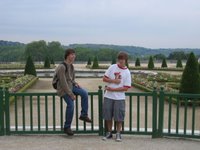
Tuesday, October 10, 2006
Saturday, August 19, 2006
Books I've read recently (updated 1-1-08)
"God is Not Great" by Christopher Hitchens, 2007. Christopher Hitchens, described in the "London Observer" as "one of the most prolific, as well as brilliant, journalists of our time" takes on his biggest subject yet-the increasingly dangerous role of religion in the world. In the tradition of Bertrand Russell's Why I Am Not a Christian" "and Sam Harris's recent bestseller, The End Of Faith, Christopher Hitchens makes the ultimate case against religion. With a close and erudite reading of the major religious texts, he documents the ways in which religion is a man-made wish, a cause of dangerous sexual repression, and a distortion of our origins in the cosmos. With eloquent clarity, Hitchens frames the argument for a more secular life based on science and reason, in which hell is replaced by the Hubble Telescope's awesome view of the universe, and Moses and the burning bush give way to the beauty and symmetry of the double helix.
"The Man Who Mistook his Wife for a Hat" by Oliver Sacks, 1970, 1998. Dr. Sacks, best known for the semi-fictional movie "Awakenings" with Robin Williams, is a collection of case histories of patients who have neurological disorders: patients who have lost their memories, who can't recognize common objects, who suffer from delusions. Dr. Sacks makes us feel the humanity of these lost souls.
"The Myth of Islamic Tolerance: How Islamic law Treats Non-Muslims" ed. by Robert Spencer, 2005. The historical, cultural, and religious elements of the violence and profound contempt for outsiders that characterizes much of the Islamic world today, written by a variety of scholars, Middle Easterners, and commentators. The wide-ranging group of essays explains how these attitudes are rooted in laws and cultural habits that are connected organically through the institution of dhimmitude. Many of these are written by Ibn Warraq and Bat Ye'Or, who is an Egyptian-born Jew.
"Quirkology: the Curious Science of Everyday Lives" by Richard Wiseman, 2007. From the cover: "Ever wondered how your surname has influenced your life? Or wished that you could tell if someone is lying? Or wanted to understand more about seduction?
Professor Richard Wiseman has spent twenty years exploring the backwaters of the human mind and going to places where mainstream scientists fear to tread. The result is Quirkology – a book that will change the way you look at life." Dr Wiseman is a great wit.
"The Economic Naturalist: In Search of Explanations for Everyday Enigmas" by Robert H. Frank, 2007. Having enjoyed Freakonomics earlier this year, Ithought this book might be similar. Dr. Frank presents a collection of ecnomic questions followed by explanations, collected by his student. Sample questions include "Why are round-trip airfares from Kansas City to Orlando cheaper than round-trip airfares from Orlando to Kansas City" and "Why is text-messaging more common in Asian countries than the U.S?" followed by an economist's reasoning. A fun read, although not as quirky as Freakonomics.
"The Trouble with Islam: A Muslim's Call for Reform in Her Faith" by Irshad Manji, 2003. Ms. Manji is a Muslim whose family immigrated to Canada in 1972, when Idi Amin expelled East Asians from Uganda. Her book is written as an open letter to her fellow Muslims. In summary, from the back cover, she writes: "Islam is on very thin ice with me...Through our screaming self-pity and our conspicuous silences, we Muslims are conspiring against ourselves. We're in crisis and we're dragging the rest of the world with us. If ever there was a moment for an Islamic reformation, it's now. For the love of God, what are we doing about it?" Her vision is to retrieve "Ijtihad," the lost tradition of independent thinking. Although I am not personally familiar with her, Ms. Manji is a known journalist in Canada, and has won prizes for her forthright opinions as well as death threats from some of her co-religionists.
"Spook: Science Tackles the Afterlife" by Mary Roach, 2005. Reminiscent of her earlier work "Stiff, " Ms. Roach investigates reincarnation, mediums and spiritualists, psychics, ghost hunting, near=death experiences, and other purveyors of the afterlife. A fun read.
"Misquoting Jesus: the Story Behind Who Changed the Bible and Why" by Dr. Bart Ehrman, 2005. A noted Biblical scholar and textual critic, Dr Ehrman explains the method by which the Bible was copied by scribes, how scholars track which versions (among thousands that exist) are the oldest or most authentic, how disparant versions were reconciled at different times depending on what beliefs were the most prevalent (such as during the Nicene deliberations), and how copying errors are discovered. One of the chapters discusses the Greek translations that were later used by the group who prepared the King James version. When some refer to reading the Bible 'in the original Greek' they are usually referring to this particular translation which was prepared in the 11th century, using manuscripts that were later found to NOT be the oldest or most faithful to the oldest known copies. The King James, which is the most popular English-language translation, was based on Middle Ages manuscripts that were known, both now and in the 16th century, as being more error-ridden than other better documented copies. Dr. Ehrman is quite readable and makes history interesting.
"Runs with Scissors" by Augusten Burroughs, 2002. An autobiographical tale of a young man - in the dictionary under 'dysfunctional' it has a picture of his family. When you read stories of young people who have managed to survive tragedy and neglect ("Angela's Ashes" also comes to mind), it makes your own problems seem petty by comparison.
"Breaking the Spell: Religion as a Natural Phenomenon" by Daniel C. Dennett, 2006. Dr. Dennett is a professor of philosophy at Tufts University. As the jacket points out, this is "not an anti-religious screed, but rather an eye-opening exploration of the role that religious belief plays in our lives, our interactions, and our country." Following Dawkins and others, he explores the foundations and historicity of morality and the continuing reasons for continued bleief in Bronze Age mythologies.
"A Devil's Chaplain" by Richard Dawkins, 2003. The book is a collection of essays by Dawkins written over a period of years, and includes a eulogy to his close friend Douglas Adam ("Hitchhiker's Guide to the Galaxy"). He covers Darwin, pseudoscience, genetics, and religion. In this collection, the reader can get a flavor of Dawkin's style and wideranging interests and passions.
"Bad Astronomy" by Phil Plait, PhD. Phil, who also runs the website badastronomy.com, writes a light-hearted by fact-filled book on common misconceptions about astronomy, including tides, stars, gravity, and the 'moon landing hoax' nuts. His book is aimed at the curious person who might not have a math or physics background but is interested in knowing a bit more about the heavens. I have given this book to several people, including a high school physics student.
"Lost Christianities" by Dr Bart Ehrman, 2003. Ehrman, who frequently appears on History Channel and the science stations. This book is a discussion of some of the different churches and beliefs of Christians during the first century. A main point of this history is that the present form of Christianity, that we tend to think of as the 'right' or orthodox viewpoint, is merely the one that won the debates. The winners get to write history, while the losers have their books destroyed, lost, or declared heretical. The religion could have just as easily turned out to be Peter's Jewish form rather than Paul's Gentile Christianity; Gnostic; Ebonite, or any of the other 40 or so verifiable church beliefs during the first two hundred years.
"The God Delusion" by Richard Dawkins, 2006. Dr Dawkins, one of the most famous skeptics, biological evolutionists, and atheists in the world, follows up his television "The Root of All Evil" with this book, which discusses the harm and negative impacts that irrational belief in religion has caused. Note: this show has not been shown in the US, but can be found on YouTube.
"Bible Prophecy: Failure or Fulfillment?" by Tim Callahan, 1997. Mr. Callahan steps through the prophecies of the Bible, both Old and New Testaments, and examines the prophecies, as well has those events or situations that are claimed as fulfillment. He also devotes a few chapters talking specifically about endtimes prophecies, such as those promoted by Hal Lindsey, 'new world order' conspiracy theorists, and the development of fundamentalism in the late 19th century American Protestantism.
"Heaven on Earth - The Rise and Fall of Socialism" by Joshua Muravchik, 2002. Maravchik's grandparents were members of the Socialist Revolutionaries in Tsarist Russia, which was one of the more radical and terror-oriented groups working in Russia prior to Lenin's takeover. This book is a collection of brief biographies of the most important socialists, from the early Babeuf, Own, Engels, Marx, and Bernstein, Lenin, Mussolini's fascist heretic, and the modern Deng, Gorbachev and others.
"Why Darwin Matters - the Case against Intelligent Design" Michael Shermer, 2006. I was fortunate to acquire this book the day before I left for a cruise with the James Randi Educational Forum (jref.org), which Dr Shermer attended as a guest speaker. So my copy is autographed! Dr Shermer lays out, with his usual clear language, the logical and scientific reasons why ID is not only just another label for creationism, but is also logically, historically, and scientifically bankrupt. I've loved his books since "Why People Believe Weird Things" came out, and found him to be friendly, personable, and highly intelligent. And a mean poker player.
'The End of Faith - Religion, and the Future of Reason" Sam Harris, 2004. Harris explores the problems that fundamentalists faiths (focusing primarily on Islam) pose on civilization and the future of society, and how unreasoning ideology threatens the safety of mankind.
"When Jesus Became God - The Struggle to Define Christianity during the Last Days of Rome", Richard E Rubenstein, 1999"
"Lipstick Jihad - A Memoir of Growing up Iranian in American and American in Iran" Azadeh Moaveni, 2005
"The Sword of the Prophet - Islam history, theology, impact on the World" Serge Trifkovic, 2002. Historical, philosophical treatise, from a neutral observer, in that he is not an adherent of any religion.
"The Battle for God - A History of Fundamentalism" Karen Armstrong, 2001 (Judaism, Christianity, and Islam) Excellent historical book, comparative theology on how fundamentalism arose in each at different times and how it affected both culture and the mainstream branches of these three religions. (I did not realize that Christian fundamentalism, the belief in the literal interpretation of the Bible, etc., only arose in the past 200 years, and in the US)
"A History of God" - Karen Armstrong (same three religions)
"Islam, A Short History" - Karen Armstrong, 2000. After the other books I've read this year on Islam (see this post), the book seems very apologetic.
"The Spiral Staircase" by Karen Armstrong, 2004. Her biography of leaving the convent and the Catholic church, her struggles at Oxford and with undiagnosed epilepsy.
"Secret Origins of the Bible" Tim Callahan, 2002. Besides the provocative title, it's a scholarly history of the stories and legends that were consolidated into what's called the 'Old Testament' sometime around 800 BC. I've read much of this history elsewhere in pieces, this is a good consolidation of the information, and is well-written and footnoted.
"King Leopold's Ghost" Adam Hochschild, 1999 (Story of Victorian-era King Leopold Belgium, and his quest to create an empire in Africa (Belgium Congo), and the brutal plundering he did, affecting tens of thousands of the natives .
"A Peace to End of Peace - The Fall of the Ottoman Empire and the Creation of the Modern Middle East" David Fromkin, 1989. See the date - prior to 9/11, but nothing really changes. They don't teach this much in school - but the British and French created the current problems in the Middle East during their failed attempts to further their empires in the days prior to WWI.
"Stalin: The Court of the Red Tsar" Simon Sebag Montefiore, 2003. More personal accounts than "The Harvest of Sorrow" by Conquest.
"Lies My Teacher Told Me - Everything Your American History Textbook Got Wrong" James W. Loewen, 1995, updated 2005. Some good information, but a little on the bash-America side.
"The Faith Healers" James Randi, 1989. His personal quest to expose some of the more prolific of the 'faith healers' -including Peter Popoff, who was the basis of the Steve Martin film "Leap of Faith."
"Flim-Flam! - Psychics, ESP, Unicorns, and other Delusions" James Randi, 1982.
"The Demon-Haunted World: Science as a Candle in the Dark" Carl Sagan, 1996. Wonderful book to give people who are deluded by pseudoscience but aren't irreversibly stupid.
"The Great Mortality: An Intimate History of the Black , the Most Devastating Plague of All Time." John Kelly. 2005 The title says it all. This is the fourth or fifth book I've read on the plague in the past two years.
"Black Rednecks and White Liberals" Dr Thomas Sowell, 2005. A book of six essays on topics such as the misperception that ghetto culture is an authentic 'black identity' rather than a carryover of impoverished white culture from pre-Civil War days; misteaching of history for political agendas; a world-wide history of slavery; and achievements of immigrants groups.
"American Gods" Neil Gaiman, 2001. Novel, winner of Hugo, Nebula, Locus, and Bram Stoker Awards. After reading it, I'm going to go out and buy the rest of his books.
"Anansi Boys" Neil Gaiman 2005. A semi-sequel to American Gods. His British roots are showing...
"Stardust" Neil Gaiman, 1999. Totally fiction. I bought it right after American Gods. This guy's a great writer. I hope he lives a long time.
"Freakanomics: A Rogue Economist Explores the Hidden Side of Everything" by Steven D Levitt and Stephen J Dubner, 2004. From the back - "Freakonomics is politically incorrect in the best, most essential way." Witty and well-written. Many topics are "if drug dealing is so profitable, why do most dealers still live with their moms?" "What your parents tell the world about you and YOUR BACKGROUND AND CULTURE with the name they pick for you." The 20 most common names picked out by low-income and by high-income families don't overlap! (And that's constant within a race...). Why did crime rates plummet and the 'super-predator' disappear about 20 years after Roe V Wade????
"The Great Influenza" by John M Barry. In the winter of 1918, at the height of WWI, history's most lethal flu virus erupted in an army camp in Kansas, moved east with American troops, then exploded, killing as many as 100 million people worldwide. It killed more people in 24 weeks than AIDS killed in 24 years, more people in one year than Black Death killed in a century. But this was not the Middle Ages, and 1918 marked the first collision between modern science and epidemic disease.
"On Food and Cooking, the Science and Lore of the Kitchen" by Herbert McGee, second edition, 2004. I wore out my 1986 paperback edition....
"Why I am Not a Muslim" by Ibn Warraq (pseudonym). A self-described Pakistani 'religious zealot' and jihad-oriented Muslim became disillusioned with the West, the free-speech advocates, the media, and nearly everyone else did not condemn the fatwa against Rushdie (author of "The Satanic Verses") but instead apologized for the Islam fanatics and said Rushdie 'shouldn't have written the book' which was a fictional novel. Warraq gives a detailed, footnoted and referenced history of Mohammad, the Arab world of his time, the development of the Koran, the Islamic borrowings from Judaism, early Christianity, Zoroastrian, Persian culture, and others. He also covers how the Islamic legal system developed and codified/fossilized during the Middle Ages, and how it affects Arab and non-Arab culture and civilization today.
"Camouflage" by Joe Haldeman, 2004. The master of science fiction...
"The Meaning of Everything" by Simon Winchester, 2004. A very readable book on the story of the Oxford English Dictionary, how it came to be, and the main characters in the development of the book, including the Civil War surgeon W. C. Minor, who was a prisoner in England's Bedlam Hospital for the Criminally Insane.
"Under the Banner of Heaven" by Jon Krakauer, 2004. Subtitled "A Story of Violent Faith" Interesting enough, when I researched this book on Amazon, there were several posts that were very hostile to the book and its message. More interesting, all of the negative posts were from LDS (Mormon) adherents who had not read the book, but were extremely angry that it had been written at all, and were of the sort "This is the One True Religion, believe in the Loving God or die" variety. The book is about a double murder that occurred against a young woman and her infant daughter, by members of a 'fundamentalist' Mormon sect who were practicing the polygamy as laid down by Smith, Young, and other Mormon leaders up until various U.S. Presidents forced monogamy on them. It is interspersed with biographical and historical information on the early cult movement, its leaders, politics, and violent philosophies. It is timely that I read it just as one of the leaders of this movement, Warren Jeffs, was arrested. Krakauer also wrote "Into Thin Air"
"Predators, Prey, and Other Kinfolk: Growing Up in Polygamy" Dorothy Allred Soloman, 2003. I saw this on the discount table at the half price book store, and after reading the "Banner" book, thought I would try this. One woman's story of growing up as the child of a man with 7 wives. She has mixed feelings about her life - loving her father, but being forced to live as outlaws, seeing her various aunts contend with jealously, pain, poverty, so that the men in this particular fundamentalist Mormon cult could fulfill their own fantasies of being a member of the 'priesthood'.
Sunday, August 6, 2006
Fly Girl



My friend Cath (that's her in the pic) and I went for a quick flight Saturday. It was a typical hot August day in Texas - the car thermometer insisted it was 103 deg F. However, the car was in the shade, so it may have been a bit confused. She had not flown her plane recently, and asked me to tag along. The sky was hazy from the heat and drought, and the land was brown, brown. We flew over Bridgeport Lake, about an hour west of Fort Worth, and could see the weekend skiers enjoying some respite the weather. Did I mention it was HOT?? Very HOT!
We also flew over some of my work sites that were in the area. For my friends who ask 'what do you do' - here's a picture of a typical gas plant. I build these, or rather, I coordinate and facilitate designers, construction, engineers, and the other hundred people it takes to build one of these. Hey, it's a living.
Catherine is a wonderful woman, a devoted mother, a brilliant engineer, fun, and beautiful (think Halle Berry). Thanks for the ride, girlfriend!
Tuesday, August 1, 2006
Ode from a Coffee Cup
Thursday, June 29, 2006
What's Inside

Is this weird or what? This is a scan of my first fill with my lap band. The technician handed me the photo, and I looking at the it, trying to fix in my mind just what I was seeing.... "I'm pretty sure I didn't have those wires along my spine last time I had a chest x-ray, did the surgeon do something I didn't know about???? I'm not paying for it!" The older nurse put her hand on my shoulder. "Honey, those are your bra hooks, and the curved lines are your underwire."
Oh, yea, I forgot about that. I'm now reminded that it's been a couple of years since my last mammogram, so I better look into that. Actually, now that I think about it, it's been 4 years. Time flies....
Saturday, April 22, 2006
Your Mileage May Vary
"I can believe things that are true and I can believe things that aren't true and I can believe things where nobody knows if they're true or not. I can believe in Santa Claus and the Easter Bunny and Marilyn Monroe and the Beatles and Elvis and Mister Ed. Listen--I believe that people are perfectible, that knowledge is infinite, that the world is run by secret banking cartels and is visited by aliens on a regular basis, nice ones that look like wrinkledly lemurs and bad ones who mutilate cattle and want our water and our women. I believe that the future sucks and I believe that the future rocks and I believe that one day White Buffalo Woman is going to come back and kick everyone's ass. I believe that all men are just overgrown boys with deep problems communicating and that the decline of good sex in America is coincident with the decline in drive-in movie theaters from state to state. I believe that all politicians are unprincipled crooks and I still believe that they are better than the alternative. I believe that California is going to sink into the sea when the big one comes, while Florida is going to dissolve into madness and alligators and toxic waste. I believe that antibacterial soap is destroying our resistance to dirt and disease so that one day we'll all be wiped out by the common cold like the Martians in War of the Worlds. I believe that the greatest poets of the last century were Edith Sitwell and Don Marquis, that jade is dried dragon sperm, and that thousands of years ago in a former life I was a one-armed Siberian shaman. I believe that mankind's destiny lies in the stars. I believe that candy really did taste better when I was a kid, that it's aerodynamically impossible for a bumblebee to fly, that light is a wave and a particle, that there's a cat in a box somewhere who's alive and dead at the same time (although if they don't ever open the box to feed it it'll eventually just be two different kinds of dead), and that there are stars in the universe billions of years older than the universe itself. I believe in a personal god who cares about me and worries and oversees everything I do. I believe in an impersonal god who set the universe in motion and went off to hang with her girlfriends and doesn't even know that I'm alive. I believe in an empty and godless universe of causal chaos, background noise, and sheer blind luck. I believe that anyone who says that sex is overrated just hasn't done it properly. I believe that anyone who claims to know what's going on will lie about the little things too. I believe in absolute honesty and sensible social lies. I believe in a woman's right to choose, a baby's right to live, that while all human life is sacred there's nothing wrong with the death penalty if you can trust the legal system implicity, and that no one but a moron would ever trust the legal system. I believe that life is a game, that life is a cruel joke, and that life is what happens when you're alive and that you might as well lie back and enjoy it"
As the Red Queen pointed out to Alice, if you practice, you can believe seven impossible things before breakfast. Unfortunately, many Americans do just that. Your mileage may vary.
Monday, April 17, 2006
Crazy Love



My kids drive me crazy. But I love them like crazy. They are both bright, witty, kind, rather cute (people tell me so), but in so many ways so TOTALLY unlike me that I wonder if we really know who their mother was. They wear me out. There is a reason that at a Certain Age, boys want to leave home, and magically, it's about the same time that you want to say "I love you very much. Go away." They never asked for much. There were no TVs and computers in their rooms, no new cars (Number One Son: "I have the second ugliest car in the entire school. It's embarassing." Mom: "Are you glad you don't have to ride the bus as a senior?") Number Two Son, I am convinced, lies awake at night trying to find ways to torture me. Wait, that would require EFFORT on his part. It must just come naturally to him. When I accused Boy One of being spoiled, he answered - Mom, I realize that I am privileged, but I don't think I am spoiled.
I want to wail about my youngest, but I realize that it could be much much worse. He's law abiding, kind, and he does have brains, they just have not quite jelled into an actual structure yet. Today, he told me that he doesn't want to do anything to give up his 'individuality'. That might sound impressive, if he didn't dress, talk, and groom himself as a clone of about two dozens of the kids that wander in and out of our home. I hate that eye-rolling thing they do when you speak English to them...
The pictures are from our Blood and Guts tour of France. The Catacombs, Versailles. Naw, they're not spoiled.
Wednesday, April 5, 2006
A tired little girl...
 I received this picture, along with a card, in the mail today. It read:
I received this picture, along with a card, in the mail today. It read:"This little girl was born Aug. 30, 1937. I figure she's about 4 yrs old, so it was probably taken in 1941 - in Electra, Tx.
Her mom always made her and her big sister wear a bonnet while outside. She looks awfully tired and is probably resting. Can you guess who she is?"
(From my mom....)
Happy 72, Daddy. Thanks for being there for me and my boys all these years.

Tuesday, April 4, 2006
Je pense...


I love history, and as the comedian Eddie Izzard says "I'm from Europe. That's where history comes from." While I don't think too much of the French people as a group, I've met wonderful individuals, and they have a beautiful country (ditto that thought on Colorado and its natives.) European history is largely a precursor of U S history. I know, I know, we have people and influence from all over the world. But American culture and our form of government are primarily of Western European descent, so even if you're immigrated from Bangladesh or Greater Mongolia, you've chosen to live in a culture predominated by western European philosophies, languages, government, religions, et al. You can add your own seasonings, but this is the dish that's on the menu.
With all that: look at a map of Europe, and France is this big ol' chunk in the middle. Whether you were marching up from Rome, headed towards the ocean from Germany, spreading Islam north from Spain, or looking for wine-growing weather from England, it's right there in the middle. The French were actually important on the world stage for a short time (as history goes), but their time has passed. But there is still two thousand years of post-Axial Age stuff to see. From the pre-Christian era ruins at Glanum, to Omaha Beach, it's all there.
Reaction from friends and family, on my two (so far) visits: "You're going to France? FRANCE? But, but, it's full of French people! And they hate us!" Yea, yea, well, I'm just going over there to exploit them. I want to see the cathedrals, climb the ruins that previous conquerors left, taste the food, smell the air. I want to shed tears on the tiny piece of land that belongs to the U.S., where we buried our dead, during one of the two times we kept the German language from being taught in the schools. I am just using them to enrich my own personal history. Last week, President Chirac stormed out of a meeting of the European Community because the speaker, a native French, announced he would use English since 'it is the international language of business." Let them pout. (Aside: when I visited Norway 10 years ago, I apologized to someone for not being able to speak any Norwegian. He said "why should you learn it? There are only four million of us in the world.") The time of French as an international language, or as the court language of Europe, is long gone. Get over it. Passe moi le bouillabaisse.
A view from my balcony in the Latin Quarter; my son and I at the Louvre. 2004
Sunday, April 2, 2006
Chaco Canyon


Chaco Canyon, near Farmington, NM. During a work trip to the area, I made a stop at the national monument here. You come upon the location suddenly, unexpectedly. The area to the east of Farmington is stereotypical New Mexico: flat, endless, dry, deserted. Like Hollywood views Texas. As you drive south from the highway, you slowly approach a great river canyon, but this canyon has been empty for a thousand years.
Anyone so interested can go to various web sites and look up the history of the place. When Europeans were building cathedrals, bridges, roads, water wheels, ships that sailed around the Horn of Africa, when the Chinese were peering through telescopes and recording the heavens, the people here gathered stones together and built a rabbit's-warren of dwellings and ceremonial rooms. Many of the hundreds of sites were reburied after excavating, to preserve them from looting and from the elements. Many were destroyed during exploration, such as when a National Geographic survey about 80 years ago used wood beams from the construction for cooking fires (this, according to the park ranger). Visited 2-2006.
Sunday, March 26, 2006
Martin Gardner book
I can understand why the general public (the great unwashed masses) might not understand the disputes between physicists over superstrings or wave theory - they (and I) do not have the math to be able to converse intelligently about such things. College calculus doesn't get me there. But that is a huge (may I say "quantum") step between misunderstanding relativity, and believing in homeopathy, psi, UFOs, and that beings from outerspace came 76,000 years ago and left their wisdom to a hack science fiction writer. Most people would scoff at the "Heaven's Gate" cult that committed mass suicide in order to hitch a ride on the spaceship trailing the Hale-Bopp comet a decade ago, but believe that big-eyed, gray-skinned aliens routinely go to remote Nebraska wheatfields and abduct semi-literate bubbas for the purpose of exploring rectums. Everyone and their pet monkey has a video camera, a digital camera, and a cell phone with a camera, and yet we can't seem to capture pics of these happenings.
It is also telling that there were NO accounts of alien abductions prior to the polularization of science fiction, and really not until the 60s and 70s when more movies started appearing, did the stories become even more prevalent. Isaac Asimov was asked by Stephen Spielberg to be a technical advisor on his movie "Close Encounters of the Third Kind" Asimov refused, because he did not want to be a part of anything that encouraged belief in, or even suggested the veracity of, visitations by UFOs. (My reference - Skeptic magazine, Issue No. 1) Good for him.
I have a friend that has been encouraging me to join Mensa, to meet more people that I might find have common interests. The one thing that keeps me from pursuing this (other than the time required....) is that I read that a higher percentage of Mensa members believe in the paranormal than do the general population! I need to research that...

